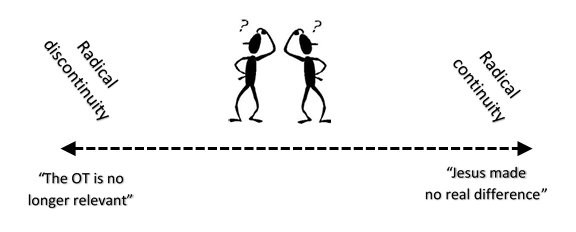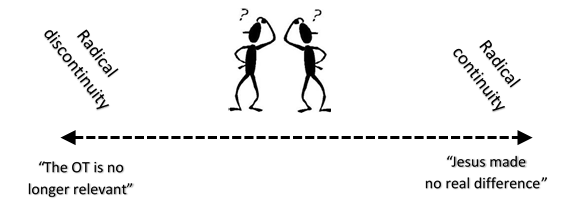What to Do With the Old Testament?
One of the longest standing problems in Christian history is the question of how to understand/use the Old Testament. Is it nothing more than an interesting, but irrelevant, account of how God used to relate to his people? Or is it so inspired that the New Testament makes no difference to its message? How do we find a ‘middle ground’ between these two extremes? Is a middle ground even what we want?

What we are looking for is a way in which Jesus’ life, death and resurrection brought something new to Christians without falsifying what came before or making it irrelevant. And that is not easy to find. There have been many models throughout history that seek to explain the relationship between the testaments. I shall analyse a few key ones here:
- The OT is about law, the NT is about grace. Here, the sole purpose of the Hebrew Scriptures is to show us that salvation by works is impossible, using the example of poor Israel who laboured under the law for hundreds of years.
- Why read the OT? To remind us of the futility of trying to be justified by the law instead of trusting freely in God’s grace.
- What’s wrong with this model? The OT is cram full of examples of God’s boundless grace. Probably the biggest is his freeing Israel from slavery in Egypt before they did anything to deserve it. This approach also tends to make God seem a bit schizophrenic, showing different sides of his character in the two testaments, which results in a lack of interest in (and ability to see the relevance of) the OT side.
- The OT is culturally specific, the NT is timeless truth. Here, God gave commands to Israel appropriate to their time and place in history (e.g. not eating lobsters), but not appropriate to us. In the fuller revelation of the NT, we have commands that apply equally to all times and places.
- Why read the OT? We can learn a few valuable snippets from looking at how key individuals acted in light of God’s commands to them. But none of those commands apply now.
- What’s wrong with this model? The NT is every bit as culturally located as the OT. There is no Christian alive today who obeys every single command contained in the NT; everyone picks and chooses what they think is culturally appropriate. But one of the real casualties of seeing the NT as timeless truth is this very failure to understand how to gain authoritative truth from the OT. While the OT remains theoretically inspired, in practice it is unusable for any kind of Christian debate.
- The NT is every bit as Jewish as the OT. Here, the only appropriate way of reading the NT is through the lens of the OT. The Jewishness of Jesus is radically emphasised and any creeping signs of ‘Greek’ thinking in Christian theology are banished as syncretistic.
- Why read the OT? Because it’s the only way to understand the NT at all.
- What’s wrong with this model? While it offers some helpful insights which increase our understanding of some parts of the NT, this approach tends to create unrealistic dichotomies between ‘Jewish’ and ‘Greek’ ways of thinking which make it sound as though Jewish thought patterns are left unchanged by Jesus. It underestimates the impact of making the Gospel available to all, regardless of cultural background, and ties us too closely to a kind of ‘intellectual Judaizing’ which has parallels with the ‘cultural Judaizing’ of the bad guys of the book of Galatians.
I suggest a simple way forward (which I won’t pretend I invented). The Old Testament, the New Testament, and the history of the church are episodes of a long continuous story which is still unfolding today. God is the same now as he always was, and his people are the same now as they always were: bound in covenant relationship to him. If we want to understand what it means to be God’s people and how God treats his people, the entire Bible is essential reading.
However, with Jesus (and the new covenant) we find a significant “plot twist” not unlike in a Hollywood movie (Sixth Sense comes to mind as a good example). As with every final twist in a story, we suddenly see everything that happened before differently in light of the new event. The whole meaning of the story has changed. But we can’t possibly understand why the plot-twist is so significant if we only begin the story right when that twist happens. The NT is meaningless without its backstory; if we don’t know the OT, we will probably invent bizarre and unlikely meanings for the NT out of our ignorance.
And even though Jesus is the climax, the story doesn’t end with the NT, either. God continues to act among his people. Which is why the history of the Church is also so, so important.
Recommended Reading
Goldingay, John. Old Testament Theology: Israel’s Gospel: 1. Downers Grove, Ill: Varsity Press,U.S., 2003.
Goldingay, John. Theological Diversity and the Authority of the Old Testament. New edition edition. Carlisle: Paternoster Press, 1995.
Ochs, Peter. Another Reformation: Postliberal Christianity and the Jews. Baker Academic, 2011.
Provan, Iain. Seriously Dangerous Religion. Waco, Tex: Baylor University Press, 2014.
Wright, Christopher J. H. Old Testament Ethics for the People of God, Nottingham: IVP, 2010.
Barney
Latest posts by Barney (see all)
- The Nicene Creed: “One Church” - July 14, 2016
- The Nicene Creed: “…for us and for our salvation…” - June 24, 2016
- Pacifism and Politics: The Tank and the Letter - May 3, 2016

